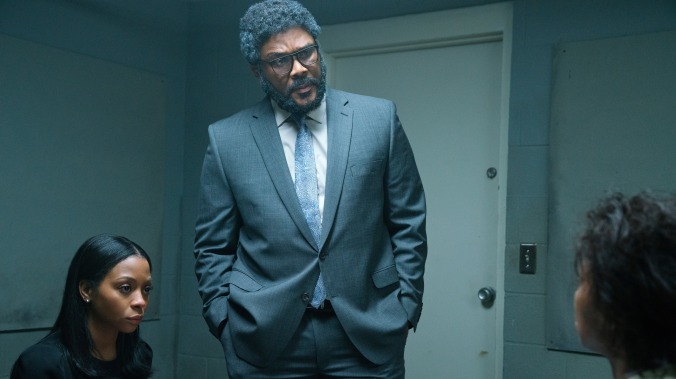Tyler Perry Studios has grown into a filmmaking empire that includes its own fully functioning studio lot. But rather than enabling Perry to make more ambitious, larger-scale movies, his efficient machinery still produces work that’s less polished than vaguely professional-looking. “Vaguely professional-looking” describes a lot of lower-tier Netflix productions, so Perry’s right at home with A Fall From Grace, his first film for the content-hungry streaming service. Obligingly, he reportedly ground this one out faster than ever, over the course of just five days, about a month before its release.
If the quick turnaround brings to mind a Roger Corman cheapie, there are retro vibes to the faux-Hitchcock plotting, too: Torrents of exposition make clear early (and often) that evidence and public opinion are stacked against Grace (Crystal Fox), a woman charged with the murder of her husband. Grace’s lawyer is Jasmine (Bresha Webb), a 26-year-old public defender disillusioned with the clients she sees as “murderers and thieves”; she’s prone to plea deals and inexperienced in court. Jasmine has been assigned to the case with the expectation that she will, indeed, plea out, following the wishes of a grimly resigned Grace, who wants only to serve her sentence in a prison close to her son and grandchild.
But encouragement from Grace’s family and her loyal bestie, Sarah (Phylicia Rashad), convince Jasmine to (eventually) demand more of her client’s story, which Grace dutifully delivers via extended flashbacks. In the movie’s least surprising twist, she’s revealed as one more of Perry’s woeful, mistreated women, deserted in middle age by an unfaithful husband and acquiescent to her sad fate. That changes when she meets Shannon (Mehcad Brooks), a younger photographer, at his art show. He shows immediate romantic interest, and she’s so intoxicated by his attention that she seems to misplace her understanding of courtship. (“He was flirting with me!” is how she undersells receiving a lavish personal gift from an acclaimed local artist.)
There are warning signs that only function as such in Perryland: Shannon is a Black man who appears to be wealthy and successful, and he’s not that interested in church. But soon Grace marries him anyway, after which point her woes return with a vengeance—or, placed into Perry’s signature mangled verbiage, “It all started to fall apart as quickly as it began.” Grace’s flashbacks are as ridiculous as anything else in the movie, but they’re also the closest it comes to savvy genre riffing. Perry attempts to reconfigure the Hitchcockian wrongfully accused narrative with midlife regret and simmering rage in need of release—a woman’s loneliness metastasizing into something scarier.
It’s a potent idea that gets diluted as A Fall From Grace stirs together murder mystery, domestic drama, and courtroom thriller. Perry maintains a conviction that the only way to emphasize anything is to have characters repeat it and rephrase it, and phrasing is not his strong suit. (Sample dialogue exchange: “Was that an apology?” “If that’s what you call it.”) At the same time, he manages to toss away countless details; most of the crucial court case is handled through a baffling montage of unidentified witnesses and basic courtroom terminology, seemingly constructed backwards from the notion that lawyers shout, “Objection!” and judges shout, “Sustained!” Stranger still, this assembly is intended to show that Jasmine has rededicated herself to her calling. This undermines the movie’s novelty, because it’s been interesting to watch a character who is actively bad at her job, and also its credibility, because Jasmine still seems like a terrible lawyer after she regains her passion.
Maybe that makes Jasmine a stand-in for Perry, who remains a creator of conflicting skill sets: an engaging performer and an incompetent dramatist; a workhorse producer and a careless writer. As ever, it’s easy to make sport of whether his throwaway lines reveal more about their author. “The owner’s a family friend, and I don’t have the heart to tell her that the lighting sucks,” Shannon says about his gallery show. The lighting in A Fall From Grace doesn’t entirely suck (there’s one striking shot where Grace and Shannon leave a neon-lit all-night diner, silhouetted in the foreground as they get into their respective cars), but the movie is full of characters holding obviously empty mugs and, in that diner scene, extras struggling not to look at the camera as they unconvincingly mime eating. It’s a five-day toss-off that’s simultaneously an impressive feat and business as usual.










































